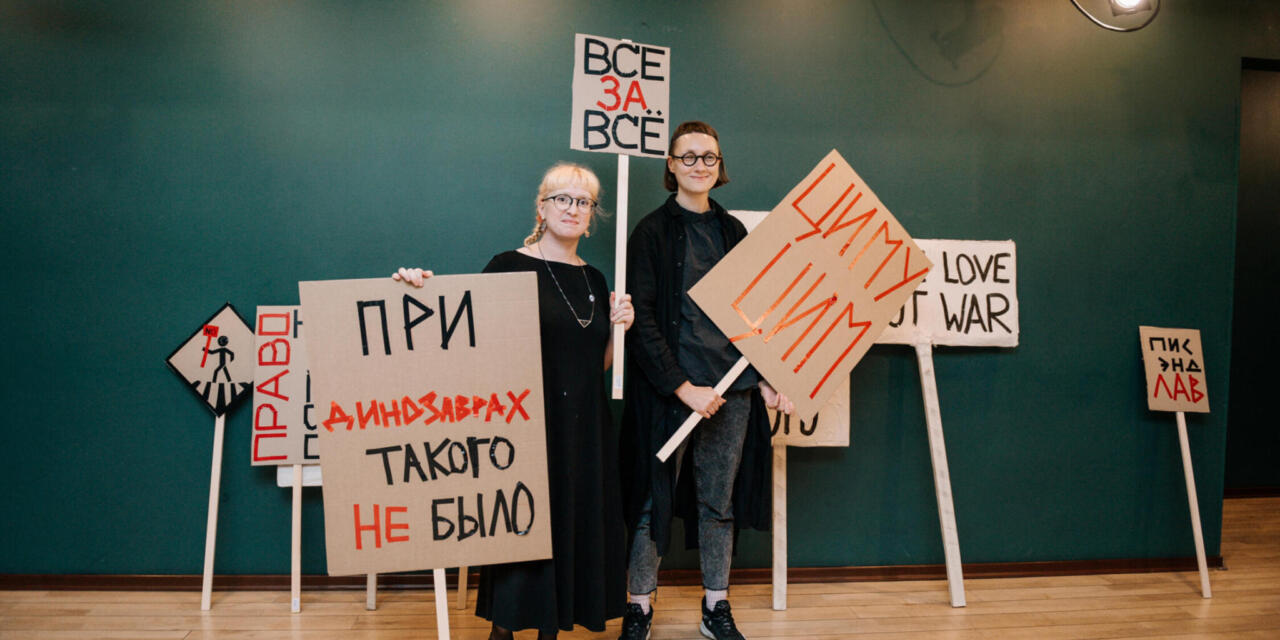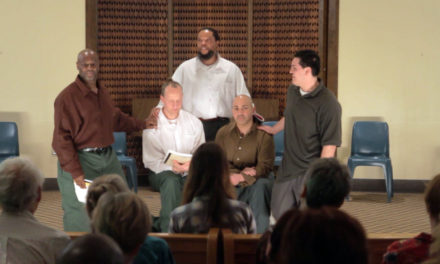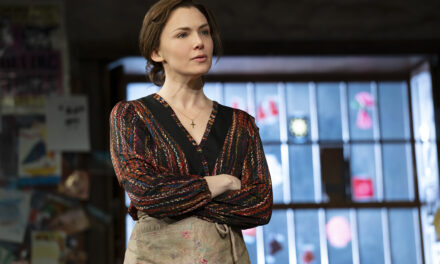This is Part II of the two-part interview. To read Part I, click here.
Yana Meerzon: Should we assume that with the change of government and the end of Medvedev’s modernization, the state returned to its habits and began to control TSIM’s repertoire of politics and choices?
Elena Kovalskaya: Till recently, according to the Russian Constitution, there has not been and there is no censorship in Russia. So, to a certain extent, one could say that there has not been any control over the art scene, but in reality, the system of state funding does allow the state to produce ideological pressure on the artists. What is more interesting here is the connection between an artistic experiment and a political role the state would impose on this experiment.
For example, around the same 2012, an independent TV channel Dozd’ has become a political venue because it refused to participate in a propaganda machine and spoke the truth. Around that time, a documentary-based company Teatr.Doc, which opened in the early 2000s, also turned into a political platform to fight the regime. Why did it happen? Teatr.Doc was created to use verbatim theatre techniques to call its spectators’ attention to the social and moral problems in Russia. It brought injustice on stage, and it offered an alternative artistic language to speak about it. Because Teatr.Doc has chosen alternative artistic ways – alternative to those of the theatrical mainstream – to point at the social ills of the society, it suddenly found itself on the margins of a theatrical process. The state pushed it out of the artistic process and turned it – maybe even against the company’s will or original objectives – into a major platform for political resistance.
Artistically, Teatr.Doc accounted for its position as “zero position.” When they spoke of social problems, they would aim of presenting them from several points of view. They focused their artistic research on the margins of the so-called “big culture”, seeking to give voice to the people who were not welcome into and by the mainstream. Although they tried to paint an objective picture, the events they chose to bring on stage were seen as problematic by the state. Teatr.Doc staged a play about the siege of the Moscow theatre Nord Ost, the shooting in the school in Beslan, the prosecution, and the death of the advocate Sergey Magnitsky, among others.
Just to reiterate – because Russian theatre remains very much homogeneous in its artistic output, politics, and preferences, anything that artistically can be considered as an experiment, including focusing on the problematic sides and events of our reality, is seen by the state as a threat or danger, and hence would turn this artistic project into a political statement of resistance or fight against the state.
I can give an example of a real political provocation, which did not bother the state. Several years ago, Russian Academic Youth Theatre (RAMT) produced Tom Stoppard’s trilogy The Coast of Utopia, which follows the story of the Russian anarchist Michael Bakunin and the history of the Russian revolutionary thought during Bakunin’s time. It was a very important production, which proposed the discussion about the ideas of freedom and politics in Russia. But because it was staged in traditional aesthetics of the proscenium stage and as a historical costume drama, the state did not pay attention to its radicalism. Artistically it was pleasing and accessible to the loyal to the state audiences, and so nobody recognized its provocative content.
But as soon as a theatre company changes its language and chooses to speak in non-mimetic expressions, or decides to bring real people on stage like Teatr.Doc does, suddenly this aesthetics puts your theatre in opposition, makes you an artist of resistance. As soon as Russia took a course on cultural conservatism in 2012, everything that artistically challenges this course was recognized as a political statement.
At the same time, TSIM has been lucky. For many years and for some reason the state did not really pay attention to the productions we produced. For instance, in 2015, we put on a play by the Ukrainian playwright Natalia Vorozhbit. It was called Sasha vynesi musor/Sasha, take out the garbage; and it was dedicated to the 2014 war in Ukraine. In this play, the action takes place after the annexation of Crimea and during the slowly developing war on Donbas. At the beginning of the play, Ukraine has already seen four waves of conscription and the characters are waiting for the fifth one; they are waiting for a new invasion of the Russian troops, their attack on Kyiv. We played this show for three years, since 2015, but nobody really paid attention.
We also produced a play by Sasha Denisova, Sforza, which metaphorically and literally re-told the events of the Donbas war, but it used the materials of the Italian Renaissance. When some people ask me today – where have you been? What did you do to resist this war? I tell them about these productions, and I keep getting surprised because many people never heard about these works.
Since February 24, 2022, the Russian propaganda has been asking those who oppose the war – “Where have you been for eight years?” This question implies that for eight years liberals have not been paying enough attention to the alleged killings of Russians in Ukraine. My answer to this question is: “We at the TSIM have been saying for eight years that separatism in Eastern Ukraine was provoked and fomented by the Putin regime.”
One of the reasons for the criminal prosecution of Kirill Serebrenikov was his great power over the souls of the audience – as well as his connection with influential statesmen. Such a connection was supposed to guarantee his safety, but it turned out the other way around. Among the versions of the reasons for the trial of Serebrennikov, the most realistic is that he was punished to intimidate his patrons.
For years neither the authorities nor the established theatre critics were interested in our work. For three years we provided space for feminist theatre. We produced the play Abuse by Natalia Zaiceva directed by Ivan Komarov. It was based on the true story of a young woman who lost her child in a court battle, whereas her family was known as free-thinking intellectuals in Moscow. Another performance /conference – Locker Room Talk – was created by a group of young theatre artists, who wanted to show that violence and abuse begin with how we use language. They drew on a play by Gary McNair but rejected the idea of a normative dramatic play and used excerpts of interviews and articles as their dramatic canvas. They turned to Augusto Boal’s Forum Theatre, in which the artists invited the audience to re-think and to re-play a sexist game to turn our attention to these forms of abuse.
Our third feminist show was called The Caries of Capitalism about the precarious lives of women today; it was based on the economic situation of the artists themselves. TSIM itself was chosen as the subject of criticism, i.e. as an example of a theatre institution that mobilizes systematic institutional abuse of its precarious employees, so these theatre-makers, who happened to work for us, used TSIM as an object of their artistic and political criticism. It was a very uncomfortable collaboration for us, but it was also useful to be able to see this theatre institute from the perspective of those who offer their labor for us. They discussed inequality in salaries and the benefits of theatre labor in independent theatre structures. For our team in TSIM this was a very important work: it put the notion of precarity in the center of our own self-reflection, and it made us ask ourselves whether TSIM’s economic and labor relations with their artists and workers are just and equivocal. It invited us to start seeking new ways of building these relationships.
Thus, because TSIM found itself on the margins of the theatre life in Moscow, despite its central location, not only we were able to produce politically provocative content, but we also created our own forum for the exchange of ideas. At an annual residency called The Black Box, at labs and conferences groups of young academics and theatre-makers came together to discuss our work. They were interested in the democratic or leftist agenda of the West. They wanted to use theatre as a platform for promoting feminist ideas, addressing the needs for (self)decolonization, and discussing climate change. These academics were true cosmopolitan citizens and thus they were pro-European, and they were the first to protest the war and leave the company as soon as the invasion began.
At the same time, I think what worked for TSIM and kept it safe, with time turned into its problem: as we tried to foster a theatre of social changes, we did not notice that the country has been dehumanized. We tried to bring transgender people, people with disabilities, and children on stage, we developed programs with theatres in Central Asia and we believed that we were helping them with their decolonization from us; we created interventions and programs for marginalized people, while many others, most of the country, happily supported the regime. And thus, we missed the moment when TSIM turned into a bubble of intellectuals and artists who failed to see a general dehumanization of the society, and the conservatism of the masses. We missed the moment when Putin’s regime, which economically presents an example of neoliberal capitalism, turned into a conservative propaganda machine, similar in its ideology to one produced by Trump. So, I can now say that although we sought social and artistic change, through our work we created a temporal vacuum, a blind zone for theatre establishment and power, to be free from their pressure, their propaganda, and their influence. But then we became victims of our freedom, which turned out to be as fleeting and transitory as freedom can be.

Russian Death, the most recent production of Dmitry Volkostrelov, the set consists of several clusters of Russian-style cemetery lattices, typically enclosing graves. Photo credit Margarita Denisova.
YM: So, what was the major reason for you to step down as a managing director of TISM when the war started? Was it an emotional and ethical gesture, or more a professional disappointment?
EK: When the war started, I felt my personal defeat. I felt that everything we fought for has turned into ashes. I spent 30 years of my professional life fighting for and believing in the theatre that can change life, make it better, more inclusive. And now everything collapsed, Russia started this war, and everything I believed in lost its purpose or meaning. Perhaps, it was only utopia, and as every utopia goes – our utopia was called TSIM – our work was also doomed and collapsed. But for me there was and there is no other theatre, but theatre for social change. Everything else – theatre for fun, for entertainment – has no value for me.
I also stepped down from my position because I did not want to become a theatre censor. Now, in this new Russia, I would have to manage and control politically minded artists. Now, I – as a managing director – would have to tell them no, and would need to stop projects because these projects are ideologically problematic for the new state. I would need to remind them that such projects can put people in jail, and so I could not bring myself into this role, I could not start telling people what they can or cannot do because of what the state allows or does not.
YM: Today, we observe this new tendency in Russia – a kind of attack on theatre with some companies being closed (like TSIM) and others being folded into pre-existing institutions when Theatre Sphera was amalgamated with Hermitage Theatre company. Is it a new step in Putin’s cultural politics?
EK: Unfortunately, this is not a new step. This is the end of the campaign for optimization of financial and material resources, which started in the regions. In Moscow, the first theatres to be amalgamated this way were Taganka Theatre and Community of Taganka Actors, which were created on the basis of Yuri Lubimov’s legendary Taganka. When these two companies were folded together, in the Fall of 2021, it seemed to many people in theatre circles that the Moscow government wanted to simply encourage the director Irina Apeksimova who has expressed her loyalty to the state many times. Now it has become clear that even this first merger was part of the campaign. One can also imagine that during a time of trouble, the state is seeking extra resources to feed its war machine and theatres turn into a convenient target to find these resources. It is also clear that such actions can be taken only during the time of war, when everybody is focusing their attention on the situation in Ukraine, and nobody has time or energy to fight for theatres.
Many of my colleagues – maybe half of TSIM’s members and partners – left the country. Others, hopefully, will be able to find work in other places, but they are frustrated and discouraged. Unlike other theatre artists, who prefer mimetic theatre and for who nothing has changed, for us, i.e. for those who tried to build these transgressive realities and to fight for the real change, the world has transformed over one night on February 24, 2022; and there is no return back, just guilt and shame.
But I remain in Moscow, by force of circumstances and by force of my convictions: Russia is my country, who better than me to clean up the ruins of our humanity.
This interview is recorded, translated, and edited by Yana Meerzon, April 4. 2022
This post was written by the author in their personal capacity.The opinions expressed in this article are the author’s own and do not reflect the view of The Theatre Times, their staff or collaborators.
This post was written by Yana Meerzon.
The views expressed here belong to the author and do not necessarily reflect our views and opinions.


















